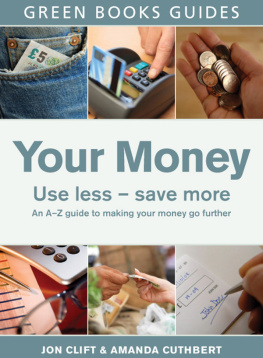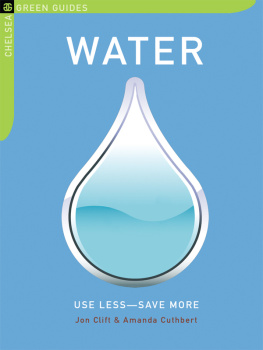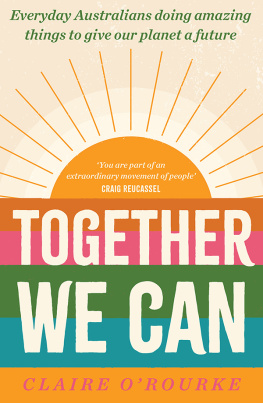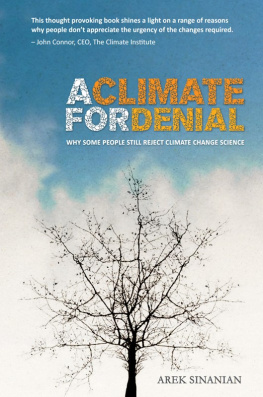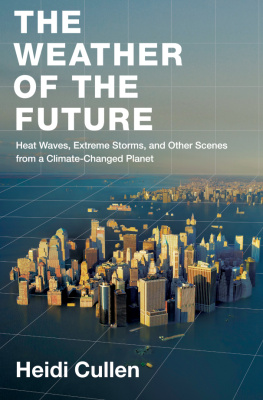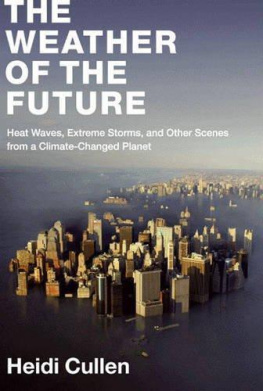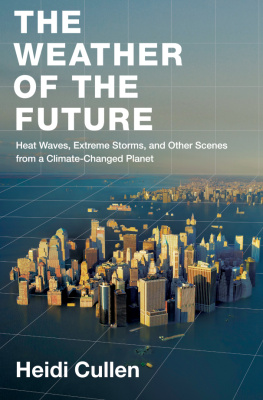
First published in 2008 by
Green Books, Dartington Space, Dartington Hall,
Totnes, Devon TQ9 6EN
www.greenbooks.co.uk
First digital editions 2012
Green Books 2008-2012
All rights reserved
Print edition ISBN 978 1 900322 24 9
PDF format ISBN 978 0 85784 074 5
ePub format ISBN 978 0 85784 075 2
DISCLAIMER: The advice in this book is believed to be correct at the time of printing, but the authors and publishers accept no liability for actions inspired by this book.

INTRODUCTION
What is Climate Change?
Climate Change is the changing of the worlds climate as a result of what we, the humans on this planet, are doing.
Its a massive problem, and in many peoples eyes the single biggest problem ever to face humankind; because if we carry on behaving as were doing now, we face large rises in global temperatures and also in sea levels, which will have disastrous consequences.
Theres plenty we can all do to slow it down. Yes, it is a massive challenge, and a topic thats surrounded by loads of gloom and doom, but fortunately we still have time.
This is not one of those scare stories that pop up now and again in the papers this is real. So much so that ever since 1988 the United Nations has had a team of about 3,000 scientists from all over the world monitoring what is happening, researching what to do about it and advising the worlds governments.
Climate Change and Global Warming both refer to the same thing, although Climate Change is a better description because the warming up of the earth changes our whole climate, including how much it rains, the strength of the wind, when and how much it snows, and the frequency and strength of storms.
What causes it?
The main cause of climate change is carbon dioxide, a gas that is produced whenever we burn fossil fuels like oil (in the form of petrol or diesel), gas or coal. We use these fuels to give us the energy that we use every day. Power stations burn fuel to make electricity for our homes. We burn fossil fuels to move our cars, buses, trains and planes, to warm our houses, to manufacture our goods the list is virtually endless.
When fossil fuels are burned, carbon dioxide (CO2) goes into the atmosphere where, as we burn more and more fossil fuels to feed our ever increasing demand for energy, the amount of CO2 gas increases. CO2 has always been in the atmosphere, trapping just enough heat for life on earth. Now this excess of CO2 has upset this delicate balance, and not enough heat can escape back into space.
Consequently the temperature of our world is slowly but surely rising, and will continue to do so unless we do something about it.
Our homes produce over 1/4 of the UKs CO2 emissions even more than our cars.
What proof is there?
We have all been experiencing more extremes of weather recently. Ever since the worlds scientists realised that the world was warming, they have been monitoring what has been going on, and the proof is now staring us in the face:
The average surface temperature of the earth, together with air and sea temperatures, is rising. We can see this because glaciers are retreating, and in some cases disappearing altogether.
The ice caps at the north and south poles are melting.
Snow and ice, which for millennia has covered large areas of frozen land, is now rapidly melting.
Eleven of the last twelve years have been the warmest years ever since records were kept.
Storms and floods are increasing in intensity and ferocity, with disastrous consequences. Weather patterns are much less predictable than they used to be.
Flowers are blooming earlier, and some foreign birds are no longer returning home in the winter.
How will climate change affect me?
The worlds scientists predict that, unless we dramatically reduce our CO2 emissions, the temperature of the earth will spiral out of control. This is not going to happen overnight, but things could change far more rapidly than many people expect. The pleasant picture of the UK merely being a little warmer and all of us living a comfortable Mediterranean existence is, unfortunately, not what is on the cards.
Summer temperatures will continue to rise, becoming life-threatening at times. Seriously heavy rainfall and consequently extensive flooding is also expected. Flooding and storm damage will also become more frequent in coastal communities, as sea levels rise and storms increase in ferocity.
In the longer term, as the ice sheets continue to melt, we could face large sea level rises. The ice sheets melting on Greenland alone will probably raise sea levels by six or seven metres, with obvious huge repercussions for many cities and areas which are by or near the coast.
Water supplies will be under duress, with water shortages becoming acute in some parts of the world. This lack of water to both drink and grow crops will, combined with the flooding, create food shortages and force people to move. Large scale migration is expected, placing huge social and political pressure on the host countries.
With the ice melting and the sea warming, sea levels are rising at a rate of about 3mm a year.
What can I do about it?
Now for the good news theres lots you can do
Most of the worlds climate scientists believe we have time to prevent climate change spiralling out of control if we act now. Within the next ten years we all need to dramatically reduce our CO2 emissions in order to minimise the impact of climate change. It wont be easy we will need to change our lifestyles but it is very achievable. Little things that we can do every day can produce large results.
Our electricity consumption has gone up 70% since 1970.
If we all turned off our TVs and other gadgets that are kept on stand-by, for example, we could shut down a couple of power stations in the UK, with huge reductions in CO2 emissions.
We are all using more and more energy: keeping our rooms so hot that we walk around in short sleeves in the winter, driving the car just around the corner to get the Sunday paper, popping on a plane for a long weekend abroad in the sun, buying French beans in January that have been flown in from Kenya the list is endless. We need to be more efficient in the way we use energy.
Simple actions can considerably reduce our energy consumption and our energy bills, and help reduce climate change: the less energy we use, the less CO2 is released, which benefits us all. Once we are aware of whats happening, most of the things we need to do are just common sense.
We dont have to shiver in unheated houses with no modern appliances, or sell our cars and go back to horses and carts; we just have to reduce our carbon footprint.
Climate change terms
Carbon footprint
Your carbon footprint is the measure of the amount of carbon dioxide your activities add to the atmosphere. Surprisingly, many items from apples to cars can have a carbon footprint too, especially if they have been flown thousands of miles or if energy has been used in their production. Your purchasing choices can make a big difference to your overall carbon footprint.
Carbon offsetting
Cant I simply pay for somebody to plant a few trees to cancel my CO2 emissions? Whilst in theory this may seem like a good idea, this process, known as carbon offsetting, is unfortunately not the way out of the problem.
The theory of carbon offsetting is based on the concept of allowing CO2 to be emitted now, and then reducing it at a later date. Carbon offsetting generally involves paying a company either to invest in renewable energy projects which may reduce CO2 emissions in the future, or to plant trees which will possibly take CO2 out of the atmosphere at some future date. But the problem of excess CO2 is here today: we cant afford to wait, and need to work in the present.
Next page


